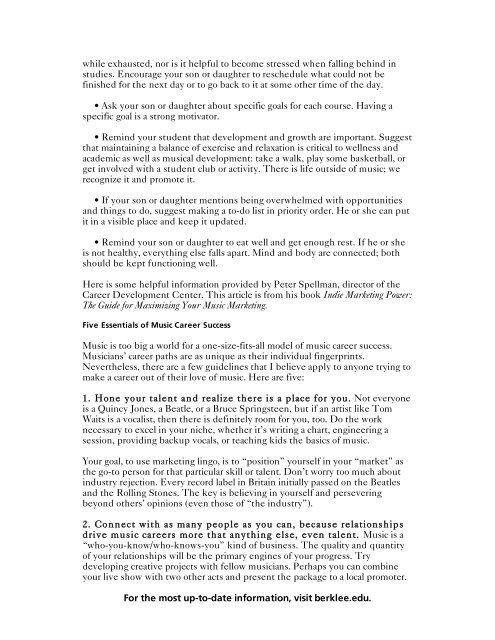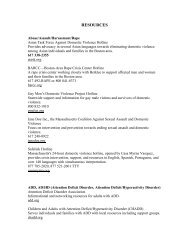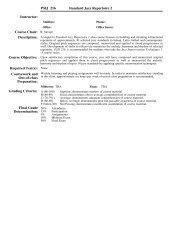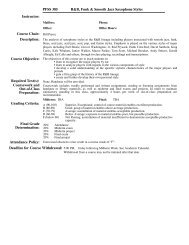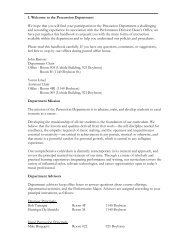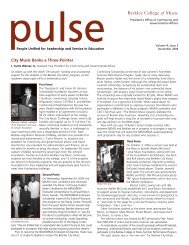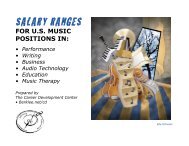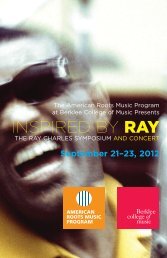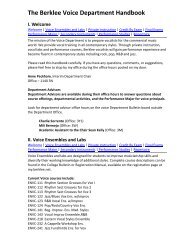Parent Handbook 2010–2011 - Berklee College of Music
Parent Handbook 2010–2011 - Berklee College of Music
Parent Handbook 2010–2011 - Berklee College of Music
You also want an ePaper? Increase the reach of your titles
YUMPU automatically turns print PDFs into web optimized ePapers that Google loves.
while exhausted, nor is it helpful to become stressed when falling behind in<br />
studies. Encourage your son or daughter to reschedule what could not be<br />
finished for the next day or to go back to it at some other time <strong>of</strong> the day.<br />
• Ask your son or daughter about specific goals for each course. Having a<br />
specific goal is a strong motivator.<br />
• Remind your student that development and growth are important. Suggest<br />
that maintaining a balance <strong>of</strong> exercise and relaxation is critical to wellness and<br />
academic as well as musical development: take a walk, play some basketball, or<br />
get involved with a student club or activity. There is life outside <strong>of</strong> music; we<br />
recognize it and promote it.<br />
• If your son or daughter mentions being overwhelmed with opportunities<br />
and things to do, suggest making a to-do list in priority order. He or she can put<br />
it in a visible place and keep it updated.<br />
• Remind your son or daughter to eat well and get enough rest. If he or she<br />
is not healthy, everything else falls apart. Mind and body are connected; both<br />
should be kept functioning well.<br />
Here is some helpful information provided by Peter Spellman, director <strong>of</strong> the<br />
Career Development Center. This article is from his book Indie Marketing Power:<br />
The Guide for Maximizing Your <strong>Music</strong> Marketing.<br />
Five Essentials <strong>of</strong> <strong>Music</strong> Career Success<br />
<strong>Music</strong> is too big a world for a one-size-fits-all model <strong>of</strong> music career success.<br />
<strong>Music</strong>ians’ career paths are as unique as their individual fingerprints.<br />
Nevertheless, there are a few guidelines that I believe apply to anyone trying to<br />
make a career out <strong>of</strong> their love <strong>of</strong> music. Here are five:<br />
1. Hone your talent and realize there is a place for you. Not everyone<br />
is a Quincy Jones, a Beatle, or a Bruce Springsteen, but if an artist like Tom<br />
Waits is a vocalist, then there is definitely room for you, too. Do the work<br />
necessary to excel in your niche, whether it’s writing a chart, engineering a<br />
session, providing backup vocals, or teaching kids the basics <strong>of</strong> music.<br />
Your goal, to use marketing lingo, is to “position” yourself in your “market” as<br />
the go-to person for that particular skill or talent. Don’t worry too much about<br />
industry rejection. Every record label in Britain initially passed on the Beatles<br />
and the Rolling Stones. The key is believing in yourself and persevering<br />
beyond others’ opinions (even those <strong>of</strong> “the industry”).<br />
2. Connect with as many people as you can, because relationships<br />
drive music careers more that anything else, even talent. <strong>Music</strong> is a<br />
“who-you-know/who-knows-you” kind <strong>of</strong> business. The quality and quantity<br />
<strong>of</strong> your relationships will be the primary engines <strong>of</strong> your progress. Try<br />
developing creative projects with fellow musicians. Perhaps you can combine<br />
your live show with two other acts and present the package to a local promoter.<br />
For the most up-to-date information, visit berklee.edu.


